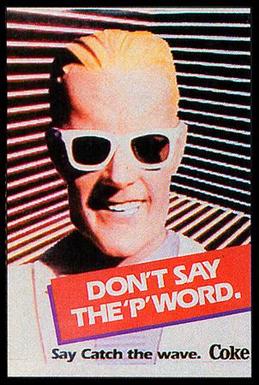New Coke
New Coke was the reformulated version of Coca-Cola introduced in 1985 by The Coca-Cola Company. The introduction of New Coke was a response to the growing market share of Pepsi, which had been gaining popularity through its Pepsi Challenge marketing campaign. The reformulation was intended to replace the original Coca-Cola formula, but it faced significant consumer backlash and is considered one of the most notable marketing failures in history.
History[edit | edit source]
Background[edit | edit source]
In the early 1980s, The Coca-Cola Company was facing increasing competition from PepsiCo. The Pepsi Challenge, a blind taste test, showed that a significant number of consumers preferred the taste of Pepsi over Coca-Cola. In response, Coca-Cola executives decided to reformulate their flagship product to create a sweeter beverage that would appeal to the changing tastes of the market.
Development[edit | edit source]
The development of New Coke involved extensive taste testing and market research. The new formula was designed to be sweeter and smoother than the original Coca-Cola. The company conducted blind taste tests with over 200,000 participants, and the results indicated a preference for the new formula over both the original Coca-Cola and Pepsi.
Launch[edit | edit source]
New Coke was launched on April 23, 1985, with a major marketing campaign. The company announced that the original Coca-Cola would be discontinued and replaced by the new formula. The initial response was positive, with a spike in sales and favorable reviews from some consumers and media outlets.
Consumer Backlash[edit | edit source]
Despite the initial success, a significant portion of Coca-Cola's loyal customer base was unhappy with the change. Many consumers preferred the original formula and felt a strong emotional attachment to it. The backlash was swift and intense, with thousands of calls and letters flooding Coca-Cola's headquarters. Some consumers even began hoarding the original Coca-Cola in anticipation of its permanent removal from the market.
Return of Coca-Cola Classic[edit | edit source]
In response to the overwhelming negative feedback, The Coca-Cola Company announced the return of the original formula on July 11, 1985, just 79 days after the introduction of New Coke. The original formula was rebranded as Coca-Cola Classic, while New Coke remained on the market under the name "Coke II" until it was eventually discontinued in 2002.
Legacy[edit | edit source]
The New Coke debacle is often cited as a cautionary tale in marketing and product development. It highlighted the importance of understanding consumer sentiment and the risks associated with changing a well-established brand. Despite its failure, the incident ultimately strengthened the bond between Coca-Cola and its customers, as the return of Coca-Cola Classic was met with widespread relief and celebration.
Related Pages[edit | edit source]
Categories[edit | edit source]
| Soft drinks | ||||||
|---|---|---|---|---|---|---|
|
Search WikiMD
Ad.Tired of being Overweight? Try W8MD's NYC physician weight loss.
Semaglutide (Ozempic / Wegovy and Tirzepatide (Mounjaro / Zepbound) available. Call 718 946 5500.
Advertise on WikiMD
|
WikiMD's Wellness Encyclopedia |
| Let Food Be Thy Medicine Medicine Thy Food - Hippocrates |
Translate this page: - East Asian
中文,
日本,
한국어,
South Asian
हिन्दी,
தமிழ்,
తెలుగు,
Urdu,
ಕನ್ನಡ,
Southeast Asian
Indonesian,
Vietnamese,
Thai,
မြန်မာဘာသာ,
বাংলা
European
español,
Deutsch,
français,
Greek,
português do Brasil,
polski,
română,
русский,
Nederlands,
norsk,
svenska,
suomi,
Italian
Middle Eastern & African
عربى,
Turkish,
Persian,
Hebrew,
Afrikaans,
isiZulu,
Kiswahili,
Other
Bulgarian,
Hungarian,
Czech,
Swedish,
മലയാളം,
मराठी,
ਪੰਜਾਬੀ,
ગુજરાતી,
Portuguese,
Ukrainian
Medical Disclaimer: WikiMD is not a substitute for professional medical advice. The information on WikiMD is provided as an information resource only, may be incorrect, outdated or misleading, and is not to be used or relied on for any diagnostic or treatment purposes. Please consult your health care provider before making any healthcare decisions or for guidance about a specific medical condition. WikiMD expressly disclaims responsibility, and shall have no liability, for any damages, loss, injury, or liability whatsoever suffered as a result of your reliance on the information contained in this site. By visiting this site you agree to the foregoing terms and conditions, which may from time to time be changed or supplemented by WikiMD. If you do not agree to the foregoing terms and conditions, you should not enter or use this site. See full disclaimer.
Credits:Most images are courtesy of Wikimedia commons, and templates, categories Wikipedia, licensed under CC BY SA or similar.
Contributors: Prab R. Tumpati, MD

